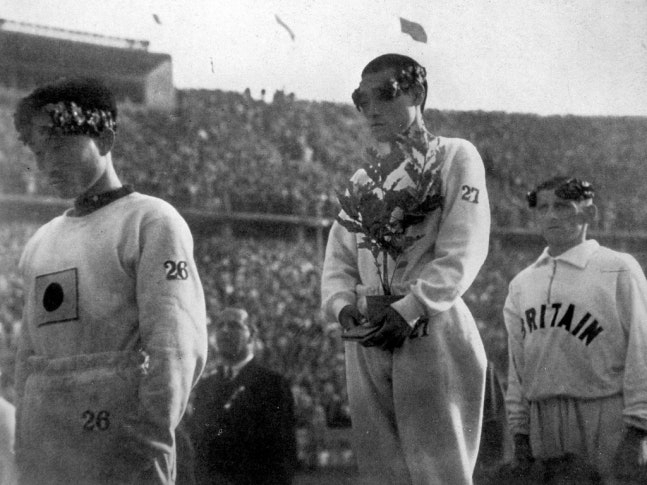 |
Marathoners Nam Seung-ryong (left) and Sohn Kee-chung (center) lower their gaze during the medal ceremony at the 1936 Berlin Olympics. (Korean Sport & Olympic Committee) |
This year, summer in South Korea is even more sizzling with excitement as its athletes have delivered outstanding performances at the 2024 Paris Summer Olympics.
Major milestones in Korea’s history of participation in the Summer Games -- like shooter Ban Hyo-jin’s win of the country's 100th gold medal and the men’s saber fencing team's win of Korea's 300th medal of any type -- have sparked awe.
But equally if not more deserving of recognition are the firsts in Korea’s Olympic history, especially given the challenges Korea overcame on its path to Olympic participation and glory.
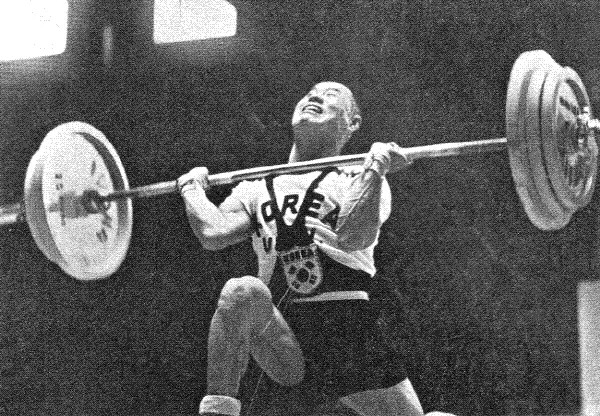 |
Kim Seong-jip competes in the men's middleweight weightlifting event at the 1948 London Summer Olympics. (Korean Sport & Olympic Committee) |
First Korean Olympians
Korea's earliest Olympic participation occurred during the Japanese colonial period from 1910 to 1945. During this time, Korean athletes were part of the Japanese delegation, meaning that they could not represent Korea.
At the 1932 Los Angeles Summer Olympics, three Koreans competed using Japanese names. Marathoners Kim Eun-bae and Kwon Tae-ha finished in 6th and 9th place, respectively, while Hwang Eul-soo placed 9th in lightweight boxing.
Four years later, at the 1936 Berlin Olympics, Korean athletes excelled in the marathon event. Seven Korean athletes competed, including marathoners Sohn Kee-chung and Nam Seung-ryong, who won gold and bronze medals, respectively.
Shattering the Olympic record in the men's marathon with a time of 2 hours, 29 minutes and 19.2 seconds, Sohn became the first unofficial Korean to claim Olympic gold under the imposed romanized Japanese name, Son Kitei.
On the podium, the sportsmanship of the Korean gold and bronze medalists was honored under the Japanese flag, with the Japanese national anthem playing. Sohn stood with his head bowed, while Nam, envious of the oak tree sapling awarded to Sohn as the winner, which he held covering the Japanese flag on his uniform, also lowered his gaze.
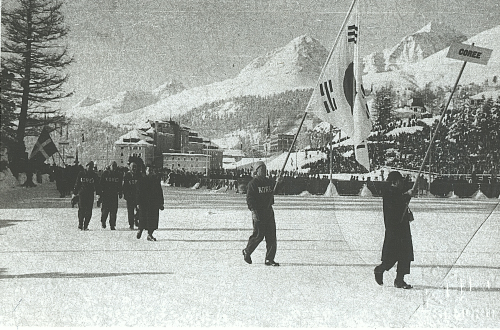 |
South Korea's delegation of athletes participates in the opening ceremony of the St. Moritz 1948 Winter Olympics. (National Archives of Korea) |
First S. Korean Olympic delegation
From Aug. 15, 1945, the date of Korea's liberation from Japanese colonial rule, to the establishment of the Republic of Korea on Aug. 15, 1948, the United States Army Military Government served as the governing body of the southern part of the Korean Peninsula. The then-Soviet Union administered the northern part.
Even before the formal launch of the official government of the Republic of Korea, the Korea Olympic Committee had received recognition from the International Olympic Committee in 1947, after meeting the requirement of having over five national sports federations affiliated with their respective international federations.
The following year, 1948, South Korea, with "Korea" and the national flag the Taegeukgi emblazoned on its uniforms, participated in both the Winter and Summer Olympic Games. This marked the first instance in which Korean athletes were able to represent their country, in this case, South Korea.
Prior to the summer event, the St. Moritz 1948 Olympic Winter Games were held in Switzerland from January to February. While a total of three South Korean athletes competed in speed skating and ended up medalless, the event was of greater significance than it might appear, as it marked the country’s official Olympic debut.
For the 1948 Summer Olympics in London, the number of South Korean athletes surged dramatically from just three in one event to 50 across seven disciplines. This notable increase was partly attributed to the nation’s fundraising efforts through its inaugural national lottery.
Team Korea ranked 32nd out of the 59 competing nations, winning two bronze medals in weightlifting and boxing. Kim Seong-jip officially became South Korea's first Olympic medalist by clinching a bronze medal in middleweight weightlifting on Aug. 10, 1948. Han Soo-an secured another bronze medal in flyweight boxing three days later.
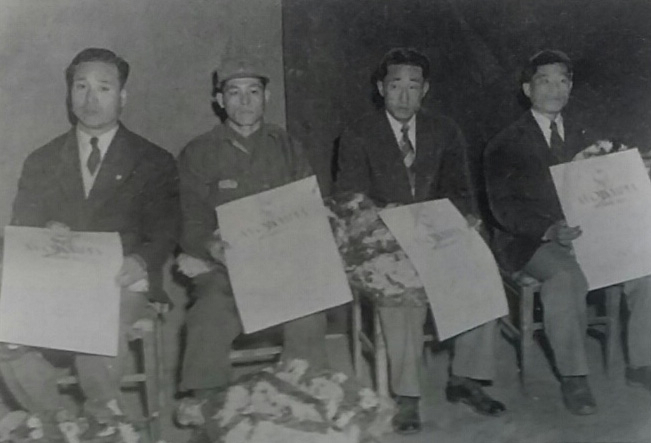 |
From left: South Korean athletes Kim Seong-jip, Han Soo-an, Choi Yoon-chil and Kim Chang-Hee compete at the Helsinki 1952 Summer Olympics. (Korean Sport & Olympic Committee) |
First medals for S. Korea
Following the establishment of the Republic of Korea in 1948, the outbreak of the Korean War two years later -- which lasted until 1953 -- prevented the nation from participating in the 1952 Oslo Winter Olympics.
Despite the ongoing war, however, South Korea was determined to send its contingent to the summer event. Twenty one South Korean competitors were on the hunt for medals at the Helsinki 1952 Summer Olympics.
Among them, two athletes claimed bronze medals: Kim Seong-jip, who had previously won bronze in middleweight weightlifting, repeated his feat, and Kang Joon-Ho secured a bronze in bantamweight boxing.
Yet, the Olympics' highest honor wasn't bestowed on the Republic of Korea until nearly three decades later.
Yang Jung-mo achieved this milestone at the 1976 Montreal Summer Olympics by grabbing the nation's first official Olympic gold medal in the men’s 62-kilogram freestyle wrestling division.
However, it took longer for South Korea's athletes to begin winning medals in the Winter Olympics.
The first medals at such events were secured at the 1992 Albertville Winter Olympics, where speed skater Kim Yoon-man became the first South Korean Winter Olympic medalist by grabbing the silver in the men's 1,000-meter event. The first Winter Olympic gold was won shortly thereafter by Kim Ki-hoon in the 1,000-meter short track speed skating event at the same Games.
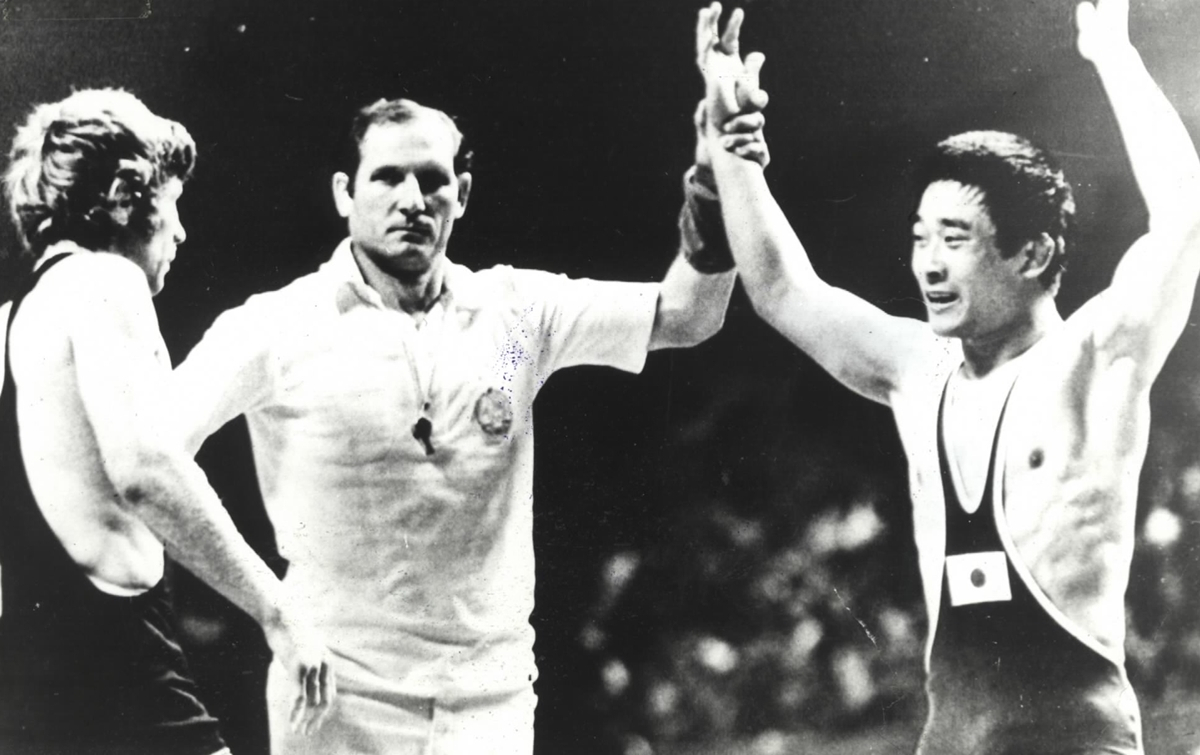 |
Yang Jung-mo wins the gold in the men's 62-kilogram freestyle wrestling division at the 1976 Montreal Olympics. (Herald DB) |
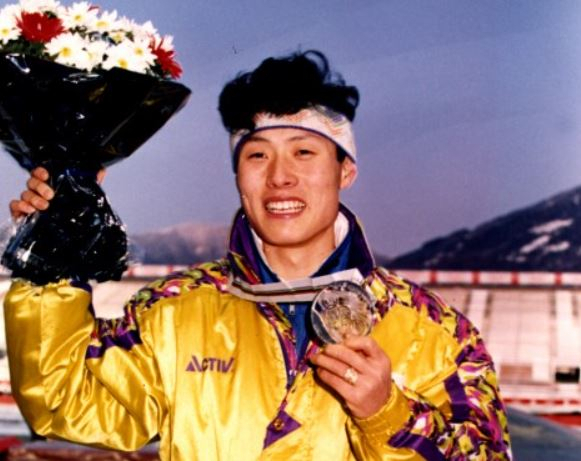 |
Speed skater Kim Yoon-man holds a silver medal at the 1992 Albertville Winter Olympics. (Korean Sport & Olympic Committee) |







